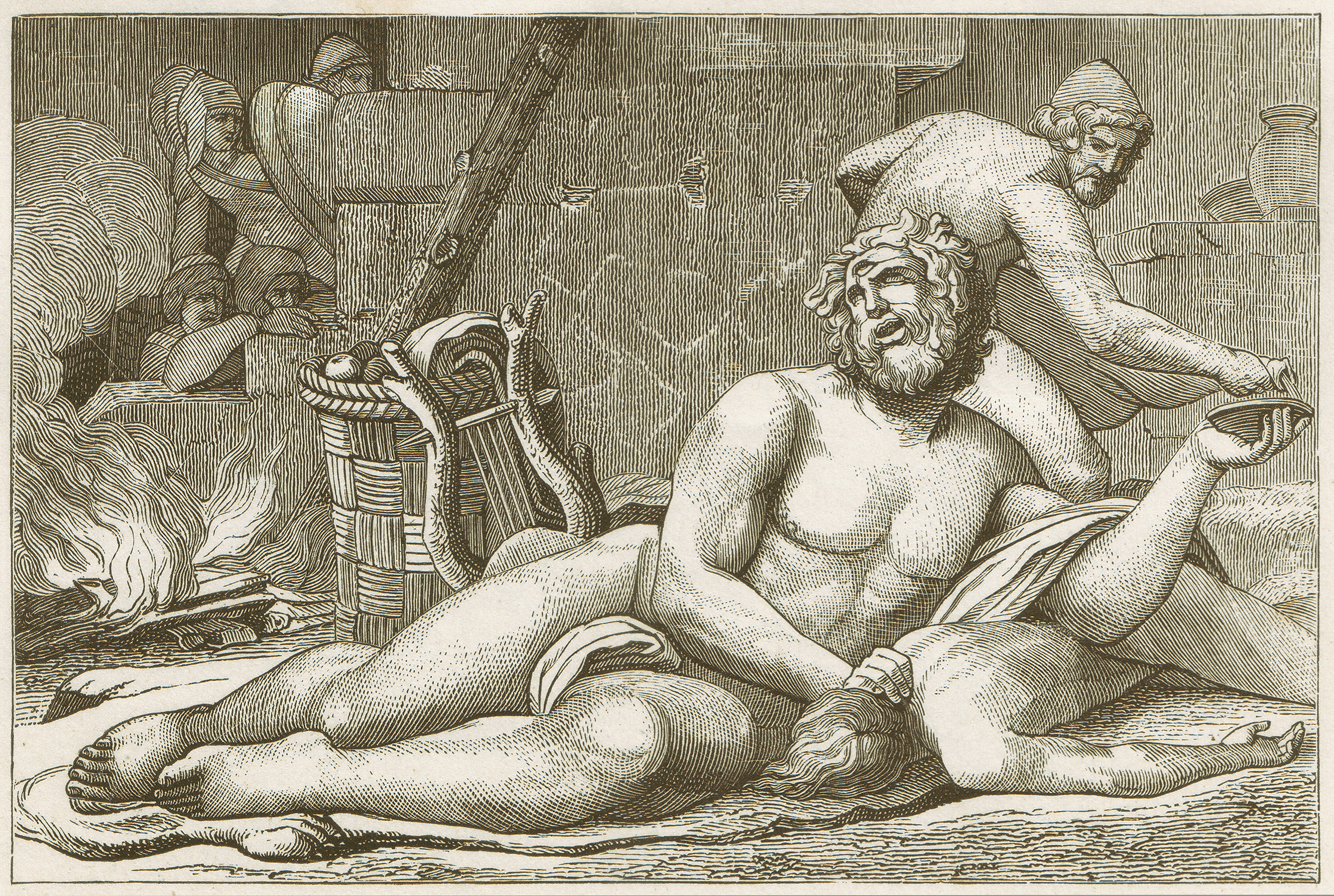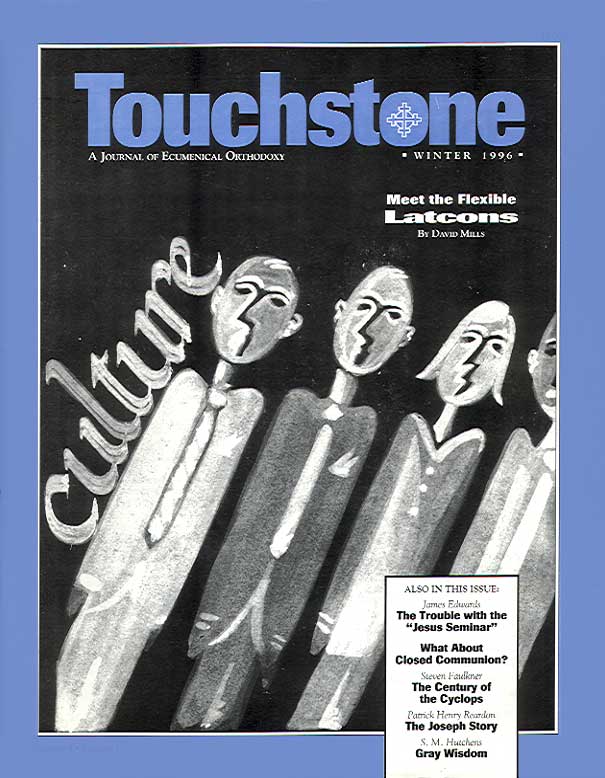Introduction
The late anthropologist Philip Rieff once lamented his sympathy with the modern, typically scientific, method of bracketing out and tossing aside various parts of reality in order to arrive at "illuminating" formulations that we can manage and measure beyond a shadow of doubt. The method strives to see less of something in order to say something more definitive about it. As Rieff put it:
I, too, aspire to see clearly, like a rifleman, with one eye shut; I too, aspire to think without assent. This is the ultimate violence to which the modern intellectual is committed. Since things have become as they are, I, too, share the modern desire not to be deceived.
In the Winter, 1996 issue of Touchstone, Steven Faulkner noted that many once poetically-minded men aimed to see the world with one eye shut, and later found themselves unable to recapture the true vision. Faulkner recalls the lament of Mark Twain, whose awe of the Mississippi led him to seek professional employment as a boat captain, where he learned to see the graceful curves and reflected images that had drawn him to the river in the first place for their more practical implications. In doing so, Twain said, he "lost something which could never be restored to me while I lived. All the grace, the beauty, the poetry, had gone out of the majestic river!"
Likewise, Charles Darwin bemoaned that his career of "grinding out general laws from a large collection of facts" had rendered him, by the end of his life, almost incapable of appreciating poetry and music.
One antidote, or at least a corrective, to this one-eyed way of knowing, Faulkner writes, was to cultivate a love of poetry, Scripture, and especially the Psalms.
Without it, our understanding of the world suffers a severe distortion. It is as if we have grown up in an age of one-eyed men who have heard rumors that people could once judge distances, depths, and colors by the use of two eyes, but are now reduced by this flat, prosaic information age that relies on scientific analysis as virtually our only source of knowledge. We are a century of Cyclops.
—Douglas Johnson, Executive Editor
(read more Editor's Picks)
The Century of the Cyclops by Steven Faulkner
Feature
The Century of the Cyclops
On the Loss of Poetry as Necessary Knowledge
by Steven Faulkner
Someone recently won a $75,000 poetry prize. I don’t recall the poet’s
name. The sponsors of the prize thought that big bucks would help revive interest
in poetry. The winner of the Ruth Lilly Poetry Prize for $25,000, Charles Wright,
admitted that this country’s interest in poetry is in something of a free
fall, but he hoped these large prizes would arrest that fall. I doubt it will
help.
Who reads modern poetry? A reporter for National Public Radio interviewed another
poet who said that people may no longer know why “The woods—are
lovely, dark and deep,” but they do understand the money message. If someone
forks out 75 big ones for poems, poems must be valuable property.
These are cries of desperation. One comes to love poetry as a man comes to love
a woman, by first catching her eye in passing, by stumbling through a few embarrassing
conversations with her, by listening to her, attending to her, getting caught
up in the mysteries of love. If someone offered us money to take an interest
in a woman, we would know that something was drastically wrong.
Like modern art, modern poetry began to lose its audience almost a century ago.
Indecipherable and egocentric, impressionistic poetry does not catch the eye,
much less bear listening to. The old standards of Beauty, such as clarity and
coherence, have fallen to the shifting winds of subjectivism, relativism, and
skepticism. What beauty remains has been stripped from reason, severed from
its old Platonic mates, the Good and the True. Our modern poetry is in pieces.
This makes a defense of poetry difficult. But defend it we must, for poetic
knowledge is an essential kind of knowledge. Without it, our understanding of
the world suffers a severe distortion. It is as if we have grown up in an age
of one-eyed men who have heard rumors that people could once judge distances,
depths, and colors by the use of two eyes, but are now reduced by this flat,
prosaic information age that relies on scientific analysis as virtually our
only source of knowledge. We are a century of Cyclops.
Poetry as a way of knowing is essential to the human being. Modern thinkers,
the heirs of Immanuel Kant, have come to depend almost entirely on discursive
reasoning, packing journals and academic books with complex analysis, deduction,
demonstration, abstraction, and argumentation. This is necessary in its place,
but it is not the only necessary knowledge.
Sir Philip Sidney, in his Defense of Poetry, written when Shakespeare
was young, said the poet “yieldeth to the powers of the mind an image
of that whereof the philosopher bestoweth but a wordish description, which doth
neither strike, pierce, nor possess the sight of the soul so much” as
poetry does.
Linear, rational discourse is the domain of philosophy and rhetoric. “The
philosopher teacheth,” said Sidney, “but he teacheth obscurely,
so as the learned only can understand him; that is he teacheth them that are
already taught. But the poet is the food for the tenderest stomachs; the poet
is indeed the right popular philosopher.” The reason for this is that
poetry appeals to the whole person, not merely to reason. Even the young and
the uneducated can appreciate it. Jacques Maritain wrote: “Poetry is the
fruit neither of the intellect alone, nor of imagination alone. Nay more, it
proceeds from the totality of man, sense, imagination, love, desire, instinct,
blood and spirit together.” Poetry can of course be highly intellectual,
demanding much from the mind, but it is always more than intellectual; it is
intuitive. It is a way of seeing and admiring the whole without taking it apart
by analysis. It is a taking into the self that which cannot be fully explained,
a way of observing with silent attention rather than active inquiry, what Wordsworth
called a “wise passivity,” or “passionate regard.”
This distinction between discursive knowledge and intuitive or poetic knowledge
is a very old idea. German philosopher Josef Pieper explains this at some length
in his book, Leisure, The Basis of Culture:
The Middle Ages drew a distinction between the understanding as ratio
and the understanding as intellectus. Ratio is the power
of discursive, logical thought, of searching and of examinations, of abstraction,
of definition and drawing conclusions. Intellectus, on the other
hand, is the name for the understanding in so far as it is the capacity of
simplex intuitus, of that simple vision to which truth offers itself like
a landscape to the eye. The faculty of mind, man’s knowledge, is both
things in one, according to antiquity and the Middle Ages, simultaneously
ratio and intellectus; and the process of knowing is the
action of the two together.
Continue Reading
Steven Faulkner teaches creative writing at Longwood University in southern Virginia. He is the author of Waterwalk: A Passage of Ghosts (2007) and Bitterroot: Echoes of Beauty and Loss (2016). Both books are memoirs of father-son journeys that followed the paths of missionary priests: Marquette (in Waterwalk) and De Smet (in Bitterroot).
Order
Print/Online Subscription

Get six issues (one year) of Touchstone PLUS
full online access including pdf downloads for only $39.95. That's only $3.34 per month!
Order
Online Only
Subscription

Get a one-year full-access subscription to the Touchstone
online archives for only $19.95. That's only $1.66 per month!
Order Touchstone subscriptions in bulk and save $10 per sub! Each subscription includes 6 issues of Touchstone plus full online access to touchstonemag.com—including archives, videos, and pdf downloads of recent issues for only $29.95 each! Great for churches or study groups.
Transactions will be processed on a secure server.
more on poetry from the online archives
more from the online archives

30.2—March/April 2017
Keep Them from Idols
The Education of Children Takes Generations of Fidelity by W. Ross Blackburn

22.2—March 2009
The Good Father
on the Manly Character of St. Joseph by Joseph R. Fornieri

32.6—November/December 2019
Strategic Christians
The Year of Our Lord 1943: Christian Humanism in an Age of Crisis
by Alan Jacobs by Jesse Russell
calling all readers
Please Donate
"There are magazines worth reading but few worth saving . . . Touchstone is just such a magazine."
—Alice von Hildebrand
"Here we do not concede one square millimeter of territory to falsehood, folly, contemporary sentimentality, or fashion. We speak the truth, and let God be our judge. . . . Touchstone is the one committedly Christian conservative journal."
—Anthony Esolen, Touchstone senior editor
Support Touchstone
00













